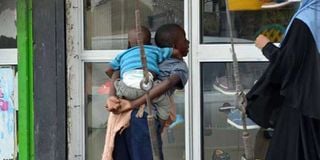Report shows many Mombasa street children radicalised

A street boy carrying a child begs along Prof Ali Mazrui Road in Mombasa. About 60 per cent of street children in Mombasa are radicalised, 90 per cent of them being members of criminal gangs, a study has revealed. PHOTO | KEVIN ODIT | NATION MEDIA GROUP
What you need to know:
- Majority of the street children, some over 20 years old, stay within Tononoka and Maboksini.
- Many of the males are not married but have sired children with female colleagues who also live in the streets.
- Many of the interviewees have been victims of police and council askaris brutality.
About 60 per cent of street children in Mombasa are radicalised, 90 per cent of them being members of criminal gangs, a study has revealed.
Findings just released from the survey conducted by Human Rights Agenda (Huria), a Mombasa-based civil society group, indicate that most of them use drugs such as bhang, cocaine and alcohol. They also chew miraa.
This may explain why several street children have in the past been recruited by Al-Shabaab agents to go to Somalia, according to intelligence information.
The report sent to the Nation by Huria CEO Yusuf Lule on Tuesday shows poverty is one of the leading reasons for the street children leaving home for towns.
“Poverty contributes 36.1 per cent of the reasons for resorting to stay in the streets. Other major reasons are family conflicts (19.9 per cent), parental neglect, physical abuse, peer pressure, step mother/father hatred and wanting to be free,” it adds.
HAVE SIRED CHILDREN
The survey focussed on eight zones of Mombasa – Kibarani dumping site, Mwembe Tayari, Maboksini slums, Makadara, Tononoka, Ganjoni, Railways and Marikiti.
Majority of the street children, some over 20 years old, stay within Tononoka and Maboksini (36.5 and 36 per cent respectively), the survey indicates.
The bigger number of the street children (83 per cent) are male and sleep on the streets, bus stations, road pavements and structures within dumping sites.
“Only eight out of the 190 interviewed said they were born in the streets,” said the report adding that most of them survive on vending stolen goods, begging, prostitution and anti-social acts such as mugging.
“Although more than 80 per cent went to primary school, less than 35 per cent completed standard eight. About 10 per cent have secondary school or tertiary education,” it added.
Majority of the males are not married but have sired children with female colleagues who also live in the streets, the report says.
WILLING TO GO BACK TO SCHOOL
About 80 per cent of them said they were willing to go back to school if given a chance. Several of them have skills in carpentry, computers, art, writing and masonry, says the report.
Majority of them do not have identity cards because they lack their parents’ national Ids or are ignorant of the process to acquire them.
“More than 70 per cent have never been employed but 70 per cent have birth certificates. Majority of them spend their income on food, clothing and shelter.
“Majority of those interviewed said they have been victims of police and council askaris brutality, they have been arrested for stealing, fighting or accused of possessing drugs,” adds the report.
Asked whom they feared most, most revealed that they feared county askaris more than the police, public or older colleagues.
Council askaris beat them up thoroughly, ask for huge bribes to release them, plant drugs on them and arrest them arbitrarily, said the report.





